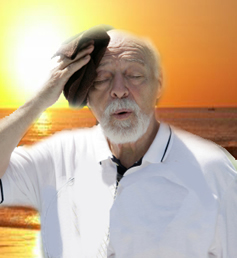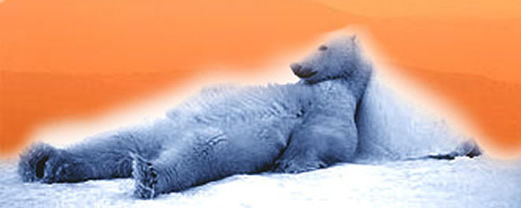BE SAFE FROM THE SUMMER: EXTREME HEAT
Extreme heat seems to be around us this summer, draining both human energy and electrical power. And extreme heat means a potential risk for one of the summer big dangers: “Heat Stroke”. The elderly suffer from heat related illnesses in disproportionately high numbers. The hot/cold sense changes with age just like the other senses. So does our ability to sweat and cool our body through evaporation. Some elderly persons can’t tell if they are on the brink of heat exhaustion. If you are caregiving for a baby or an elderly or frail, please remember the following: o When the humidity is high, sweat will not evaporate as quickly, preventing the body from releasing heat. Being an elderly, or have obesity, fever, dehydration, heart disease, mental illness, poor circulation, sunburn, or some prescription drugs and alcohol use create additional risks. o Everyone needs to drink a lot of extra fluid during extreme heat. Most healthy individuals will naturally replenish their body's fluids when they get thirsty.But for many older adults, the thirst mechanism is not as finely tuned as in younger people. And for those seniors who have suffered from a stroke, Alzheimer's or another brain disease, their thirst mechanism is even less likely to direct them to consume enough fluids.Please make water easily available to those in your care and encourage them to drink it, even if it means extra trips to the bathroom or more cleaning and to change of clothes. Check with the physician about residents or clients told to limit their fluid intake. o Many medications often taken by seniors for high blood pressure and heart disease.One example, are the diuretics – they remove salt and fluid volume from the body. Coupled with perspiring from high temperatures, diuretics can lead to dehydration, which, in turn, can lead to discomfort, confusion, damage to major organs and even death. Additionally some medications are dangerous to take if the person is exposed to intense sunshine. These include psychotropics (haloperidol or chlorpromazine); medications for Parkinson’s disease, because they can inhibit perspiration; and tranquilizers such as phenothiazines, butyrophenones and thiozanthenes. Several antibiotics also have sun side effects. Check package inserts. Also you need to keep on mind that salt tablets are not recommended because they can cause more harm than good, according to St. John’s Midwest Sports Medicine Center. oThe best way for seniors to stay cool during a heat wave is to stay indoors with the air conditioner on high. If you don't have an air conditioner, consider taking a trip to one of the COOL ZONE sites, visit your closer Senior Center where you may find many activities or go to the mall, library, or movies for a couple of hours. A fan can help, but it can't take the place of an air conditioner. If the temperature reaches the 90s, even the best fan may not protect you from heat exhaustion or heat stroke. o If you are in a long term care facilities try to stay at the activities room since all long term care facilities must have one large air conditioned space (a day room or activities room) open to residents. When the thermometer tops 90 and during ozone alerts, all residents should have frequent cool down times; those with respiratory problems should spend most of their time in air conditioning. Heat exhaustion o Heat exhaustion is a milder form of heat-related illness. It can develop over several days of exposure to high temperatures and inadequate or unbalanced replacement of fluids. Those most prone to heat exhaustion are elderly people, those with high blood pressure and those working or exercising in a high heat environment . o With heat exhaustion, skin may be cool and moist. The pulse rate will be fast and weak; breathing, fast and shallow. There may be heavy sweating, paleness, tiredness, weakness, dizziness, headache, nausea or fainting. If heat exhaustion is suspected, have the person drink cool, nonalcoholic beverages; cool off with a shower; dress as light as possible; and rest. Heat stroke can be life-threatening It occurs when the body becomes unable to control its temperature: the body’s temperature rises rapidly, the sweating mechanism fails and the body is unable to cool down. Body temperature may rise to 106 degrees or higher within 10 to 15 minutes. WARNING SIGNS Warning signs of heat stroke vary but may include: red, hot dry skin; a temperature of 103 degrees or higher; rapid strong pulse; throbbing headache;dizziness; nausea; confusion; and unconsciousness.
More safety advices with COOL ZONE |
|||
About Us | Privacy Policy | Disclaimer | Contact Us TEL. 619-427-4111 EMAIL: health@infooption.com Salud + Health Info is for information and educational purposes only. You should not rely on this information as a substitute for personal medical attention, diagnosis or hands-on treatment. If you are concerned abut your health or that of a child, please consult your family’s physician or health provider immediately and do not try and diagnose yourself. Copyright © 2001-2010 Info Option Network |
|||
 info
info
The first, the best & the only English & Spanish Magazine in San Diego, California
| EXTREME HEAT!!! | |
| Health Officials Warn of Dangers of Hot Vehicles | |
| A good idea born from a bad situation | |
| A “Cool” Place to Stay Cool during a heat wave | |
| A “Cool” Place to Stay Cool during a heat wave ( in PDF format) | |
Keep your kids safe Finally it is Summer !!! There's a world of fun waiting for your kids. But parents should look at these first few weeks of summer as a time of transition. Continued |
|
| County Urges to Take Precautions in Hot Weather | |
| Better be Safe than Sorry With the Sun | |
| Sun Safety | |
| SummerTips for healthy skin | |
SummerTips for healthy skin The hot, hazy ans sticky days of summer are here! -- and so is overexposure to the sun. Contrary to popular myth, a good tan is not a measure of good health, but actually ...more |
|
What You Should Know About Melanoma ....Melanoma is the most serious of the common type of skin cancer. The good news is that most melanomas can be found early and treated successfully. This brochure from the American cancer Society describes risk factors for this type of skin cancer, and important tips for finding it early. |
|
| More information related | |
| Fireworks injuries | |
| Summer vision care | |
| Food Poisoning | |
| Safety Around the Water | |
Avoid Dehydration!!! Even minor dehydration can lead to poor performance and reduced coordination, as well... More |
|
| Why to Avoid Dehydration? | |
|
|

